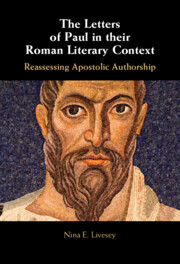Book contents
- The Letters of Paul in their Roman Literary Context
- The Letters of Paul in their Roman Literary Context
- Copyright page
- Dedication
- Contents
- Preface
- Acknowledgments
- Note on the Text
- Abbreviations
- Introduction
- 1 The Press toward the Authentic-Letter Perspective
- 2 Paul, Pauline Communities, and Genuine Correspondence
- 3 Seneca’s Moral Epistles and Pauline Letters as Teachings
- 4 Pauline Letters as Second-Century School-Setting Compositions
- Epilogue
- Appendix
- Bibliography
- Index
Introduction
Challenging a Prevailing Paradigm
Published online by Cambridge University Press: 05 December 2024
- The Letters of Paul in their Roman Literary Context
- The Letters of Paul in their Roman Literary Context
- Copyright page
- Dedication
- Contents
- Preface
- Acknowledgments
- Note on the Text
- Abbreviations
- Introduction
- 1 The Press toward the Authentic-Letter Perspective
- 2 Paul, Pauline Communities, and Genuine Correspondence
- 3 Seneca’s Moral Epistles and Pauline Letters as Teachings
- 4 Pauline Letters as Second-Century School-Setting Compositions
- Epilogue
- Appendix
- Bibliography
- Index
Summary
This chapter highlights the prevalence and importance of pseudonymous letter collections of the Second Sophistic. It indicates several commonalities between the so-called authentic letters of Paul and other pseudonymous fictional letter collections of the period. Comparanda include the Platonic Epistles, the Letters of Apollonius of Tyana, and the Correspondence of Paul and Seneca. All these letter collections contain indications of the attempt to hide their fictionality, distinct and apparent changes in the portrait of the featured character between what is known of the figure from elsewhere and his portrayal within the letters, and a lack of chronological coherence among the letters of the collection. The chapter also provides a summary of the Dutch Radical perspective on Pauline letters. In the late-nineteenth century, scholars such as Bruno Bauer, Abraham Loman, Rudolf Steck, and Willem C. van Manen rejected the authenticity of all the Pauline letters, arguing that their developed theology indicated a timeframe beyond the mid-first century and that a lack of evidence of Pauline letters prior to the second century likewise pointed to their second-century emergence and their status as non-Pauline.
Keywords
- Type
- Chapter
- Information
- The Letters of Paul in their Roman Literary ContextReassessing Apostolic Authorship, pp. 1 - 30Publisher: Cambridge University PressPrint publication year: 2024

